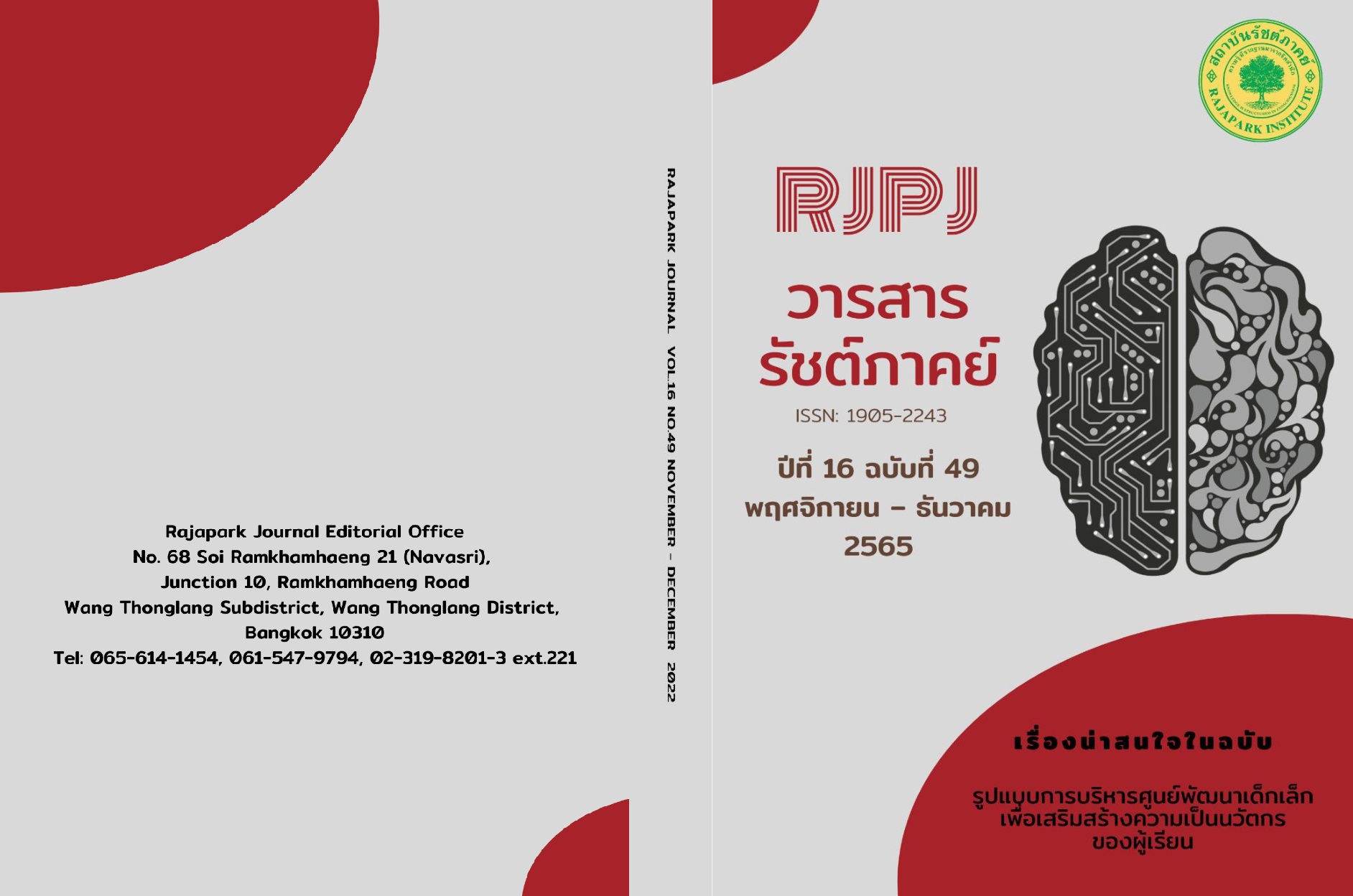Strategies for Information Technology Promotion for Learning Management of Schools Under the Office of Kamphaeng Phet Primary Educational Service Area 1 and 2
Main Article Content
Abstract
The objectives of this research and development were 1) to study conditions, problems, and factors; 2) to develop strategies; 3) to evaluate strategies for promoting the use of information technology for learning management of basic educational institutions under the Office of Kamphaeng Phet Primary Educational Service Area 1 and 2. There were three stages of research methodology: (1) to study the condition, problems, and factors using the questionnaire with a sample of 560 people and a group discussion of 17 people; (2) to develop a promotion strategy by analyzing documents. The method was used to interview 12 people from 3 schools, small, medium, and large, and to draw up a strategy. By 17 and the consistency of strategy was examined by nine expert-based seminars (3) to evaluate the developed strategies. Using the method of interviewing 17 people. The results of the research showed that 1) conditions, problems, and factors were encouraged and given opportunities for teachers to perform their work by using information technology in the operational planning meetings. But there is insufficient information for planning and a lack of a manual for collecting information for monitoring and evaluating the project. But educational institutions also promote factors related to the use of information technology by building networks systematically and effectively. 2) Strategies to promote include 4 visions, 4 missions, 4 goals, 4 strategic issues, 9 strategies, 29 indicators, and 64 measures, and 3) Strategic assessment results in Consistency, suitability, feasibility, and usefulness
Article Details

This work is licensed under a Creative Commons Attribution-NonCommercial-NoDerivatives 4.0 International License.
Views and opinions appearing in the Journal it is the responsibility of the author of the article, and does not constitute the view and responsibility of the editorial team.
References
Bateman, T.S., & Snell, S.A. (1999). Management (4th ed.). McGraw-Hill.
Chamornman, U. et al. (2010). Control, measurement, assessment and knowledge management. Chulalongkorn University.
Damnoen, P. S., Chansongpol, T., Hirunburana, W., & Somthawinpongsai, C. (2021). Development of Student Characteristics in accordance with the Nawaluk Framework of the Buddhist Intragration of Buddhapanya Sri Thawarawadee Buddhist College. Journal of MCU Buddhapanya Review, 6(2), 196–205.
Iamsiriwong, O. (2017). System analysis and design. SE-EDUCATION.
Kamphaeng Phet Primary Educational Service Area Office 1. (2013). Fiscal Year 2019 Action Plan. Kamphaeng Phet, Kamphaeng Phet Primary Educational Service Area Office 1.
Kitchainukul, T. (2006). How do organizations have a good strategic plan. Retrieved from http://www.thailandindustry.com/home/TOPStory_preview.php?id=40§ion=8& rcount=Y
Krejcie, R.V., & Morgan, D.W. (1970) Determining Sample Size for Research Activities. Educational and Psychological Measurement, 30, 607-610.
Ministry of Education. (1999). Guidelines for the implementation of educational reforms of the Ministry of Education. Teachers Council of Thailand Printing House.
Nookung, P., & Chusuwan, R. (2022). Strategies for Education Management Next normal: The Next normal of Education Management to Develop the Quality of Learners. Journal of Multidisciplinary in Humanities and Social Sciences, 5(3), 776–789.
Nuansakul, W. (2008). Documents for training courses. Non-Linear Video Editing, Class 9 “Integrating Video with Other Electronic Media”. Educational Technology Department, Office of Academic Resources Ubon Ratchathani University.
Phakphaswiwat, S. (2008). Strategic Management (18th ed.). Amarin.
Phetchaboon, C., Wongnaya, S., & Sompongtam, C. (2013). Strategies for Internal Quality Assurance System of Primary Schools Under Kamphaengphet Primary Educational Service Area 1 and 2. Journal of Education Naresuan University, 15(1), 70-79.
Photibuatong, T., & Surungkapiprat, J. (2022). Approaches for Academic Management Development of Secondary Schools According to The Concept of Digital Intelligence. Journal of Educational Management and Research Innovation, 4(2), 127–140.
Phumphongkhochasorn, P., Damnoen, P. S., Suwannaprateep, T., & Phoomparmarn, U. (2021). National Educational Standards and the Improvement of Thai Education System with World Class. Asia Pacific Journal of Religions and Cultures, 5(1), 75–86.
Sangkaew, K. (2022). A Development of Instruction to Enhance Comprehensive Reading and Critical Thinking of Matthayom 3 in The Secondary Educational Service Area Samut Sakhon Samut Songkham. Journal of Educational Management and Research Innovation, 4(2), 93–106.
Saritwanich. S. (2003). Strategic management, concepts and theories (2nd ed.). Thammasat University.
Sitthipongsakul, B., & Intarak, P. (2022). The Administrator’s Leadership and High-Performance Organization of school under Samutsongkhram Primary Educational Service Area Office. Journal of Multidisciplinary in Humanities and Social Sciences, 5(3), 1205–1221.
Soontrayuth, T. (2008). Reformed management: theory, research and educational practice. Netikul Press.
Suanpang, P. (2009). Information technology and innovation for knowledge management. SE-EDUCATION.


